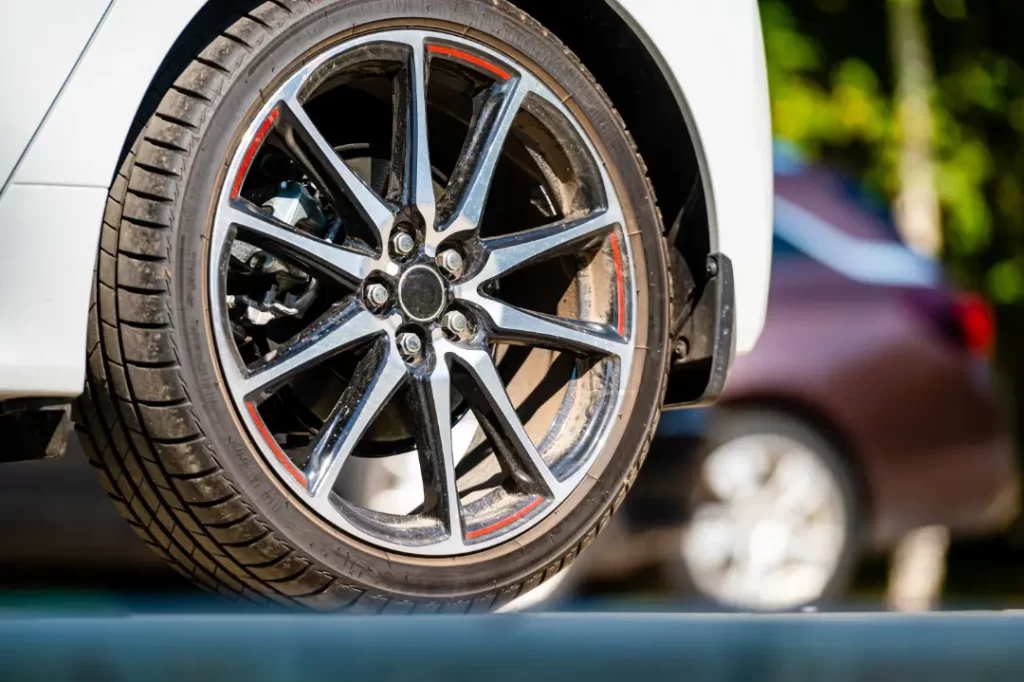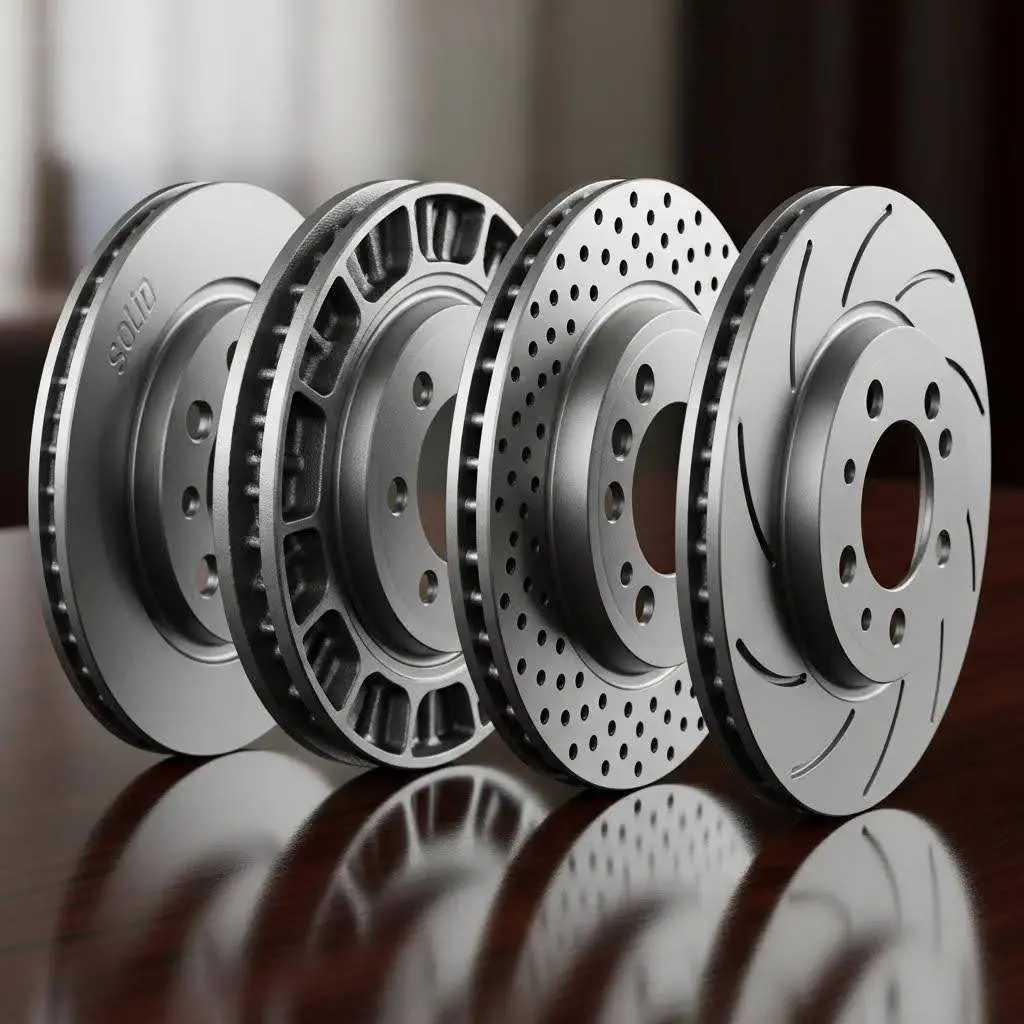Knowing when to switch to summer tyres is crucial for optimal driving performance. Generally, you should make the switch when temperatures consistently remain above 7°C, as summer tyres are designed to perform best in warm conditions. This article will explain why this temperature is important and how to monitor it effectively.
Key Takeaways
- Summer tyres are designed for optimal performance in temperatures above 7°C, providing better grip, handling, and braking than winter tyres.
- Switching to summer tyres when temperatures consistently exceed 7°C ensures better performance, reduces tyre wear, and improves safety and fuel efficiency.
- Proper preparation is essential for maximising the performance and lifespan of summer tyres, including checking tyre pressure and properly storing winter tyres.
Understanding Summer Tyres
Summer tyres are specifically designed to excel in warm conditions, providing optimal grip, handling, and braking on roads when temperatures are above 7°C. Unlike winter or snow tyres, which are built to handle icy conditions with their deep treads and softer rubber compounds, summer tyres feature high tread elasticity and stiff compounds. These tyres are made from different rubber compounds that maintain their shape and effectiveness on warm roads, ensuring better grip and performance. In contrast, winter tyres are specifically designed for cold weather conditions.
A key feature of summer tyres is their excellent grip, which is essential for control during sharp turns and quick stops. They offer:
- Precise handling
- Short braking distances in both wet and dry conditions
- Unique design for improved cornering
- Quick and accurate steering response
These features make summer tyres, ideal for driving on a summer tyre.
Understanding the fundamental differences between summer and winter tyres is key to appreciating their respective roles. While winter tyres are designed to perform on snow and icy conditions, summer tyres thrive on warm roads, delivering better fuel efficiency, traction, and longevity. This distinction underscores the importance of switching back to summer tyres as temperatures rise and roads heat up.

When to Switch to Summer Tyres
Switching to summer tyres at the right time amplifies their benefits. The general rule of thumb, or the ‘rule of seven,’ suggests that you should fit summer tyres when temperatures consistently climb above 7°C. This temperature threshold is critical because the rubber compounds in summer tyres are engineered to perform optimally in these conditions.
The switch isn’t solely about a specific calendar date but also involves tracking daily temperatures. Once the temperatures start to remain consistently above 7°C, it’s time to make the switch. Making the switch ensures that your tyres can provide the best grip and handling, reducing the risk of accidents on slippery roads.
Delaying the switch from winter to summer tyres can hasten wear on dry tarmac and compromise performance. While excellent in cold conditions, winter tyres can wear out quickly in warmth, leading to unnecessary expenses and decreased safety. By switching to summer tyres at the right time, you protect both your tyres and your wallet.
Benefits of Switching to Summer Tyres
Adopting summer tyres with rising temperatures brings many advantages. One of the most significant advantages is the high grip levels these tyres provide on both wet and dry roads during the warmer months. This enhanced grip translates to better control over your vehicle, especially during sudden stops or sharp turns.
Besides enhanced grip, summer tyres provide:
- High curve stability, vital for control during high-speed drives or tight corner navigation
- Enhanced handling performance
- The overall safety of your driving experience.
Furthermore, summer tyres are designed to offer optimal mileage performance at summer temperatures, meaning they are more durable and fuel-efficient than winter tyres in the same conditions. Fuel efficiency is another key benefit of using summer tyres in the appropriate season. The unique composition of these tyres reduces rolling resistance, which in turn improves fuel economy.
In warmer conditions, summer tyres also have better longevity compared to winter tyres, ensuring you get the most out of your investment. Overall, using the right tyres for the right season, such as winter and summer, can significantly enhance your driving experience and safety.

Risks of Delaying the Switch
Postponing the switch to summer tyres carries several risks, especially when driving in winter conditions. One of the primary concerns is reduced grip and longer braking distances. Winter tyres, designed to perform in cold and icy conditions, can warm up too quickly in warmer weather, negatively impacting braking performance and handling. Such changes could result in dangerous driving conditions, especially during emergency stops or sudden manoeuvres.
Additionally, using winter tyres in warm weather can have several negative effects:
- The softer rubber compounds used in winter tyres will soften even further on warm roads, causing them to wear out much faster. This accelerated wear reduces the lifespan of your winter tyres and compromises their effectiveness when you need them again in the winter.
- Winter tyres generate more rolling resistance compared to summer tyres, which can lead to poorer fuel efficiency.
- The tread pattern of winter tyres is designed for snowy and icy conditions, not warm and dry roads. Using them in warmer weather can result in reduced traction and handling performance.
It is recommended that you switch from winter to summer tyres when the weather gets warmer to ensure optimal performance and longevity of your tyres.
In summary, delaying the switch can cause increased wear and tear, reduced performance, and higher fuel costs. These risks highlight the importance of timely tyre changes to ensure safety, performance, and cost-efficiency.
Preparing Your Car for Summer Tyres
Proper car preparation is critical before adopting summer tyres to guarantee safety and peak performance. One of the first steps is to check the tyre pressure. Proper tyre pressure is crucial for maintaining grip, handling, and fuel efficiency. You can check tyre pressure using a gauge at petrol stations or a portable LED tyre pressure gauge. Make sure to check the pressure when the tyres are cold to get accurate readings.
The recommended tyre pressure for your vehicle can usually be found in the vehicle handbook, inside the fuel cap, or on the driver’s door. If the tyre pressure is too low, you can inflate the tyres using a hose fitting and inflator until it reaches the correct PSI. Conversely, if the tyres are overinflated, you can release air using the appropriate hose or a manual air inflator pin. Don’t forget to reattach the valve cap after adjusting the tyre pressure to prevent air loss.
These steps ensure that your summer tyres perform optimally and safely on warm roads. Proper preparation also helps extend your tyres’ lifespan, making your drive smoother and more efficient.
Storing Winter Tyres
Once you transition to summer tyres, correct storage of your winter tyres is necessary to keep them in good shape for the next cold season. Start by thoroughly cleaning the tyres with detergent, water, and a tyre brush to remove road grime and brake dust. Avoid using tyre dressing or gloss products before storage, as these can hinder the tyre’s longevity.
The storage location is also crucial. Ensure the tyres are kept in the following conditions:
- Out of direct sunlight to prevent UV rays from damaging the rubber
- In a cool, dry, and moderately ventilated environment
- Away from open air and items that generate ozone, such as electric motors
- Store the tyres in large, airtight plastic bags to minimise the evaporation of oils from the rubber compounds.
Store tyres with white sidewalls and white areas touching white to prevent discolouration. Standing tyres upright is the best storage method to stress them less. If the tyres are mounted on rims, stacking or hanging them is preferable; avoid hanging unmounted tyres. Following these storage tips will help maintain the integrity and performance of your winter tyres for future use.

All Season Tyres vs Seasonal Tyres
Deciding between all-season tyres and seasonal ones can be challenging. Here are some key points to consider: All-season tyres offer versatility and can handle a variety of weather conditions, but they may lack the performance of seasonal tyres in extreme temperatures. It’s important to understand the difference between summer and winter tyres, as the latter is specifically designed for colder conditions, providing better grip on icy and snowy roads. Ultimately, your decision should hinge on your typical driving conditions and climate throughout the year.
- All-season tyres combine features of both summer and winter tyres, making them suitable for most weather conditions.
- They provide good handling and traction year-round.
- However, they are less effective than dedicated seasonal tyres in extreme conditions like ice and heavy snow.
When used correctly, seasonal tyres offer the best safety, fuel efficiency, and longevity. They are designed to perform optimally in their respective seasons, ensuring the best handling, braking, and fuel consumption. For instance, summer tyres should not be used all year round as they are not suited for cooler temperatures and slippery conditions.
While all season tyres offer the convenience of not needing to be changed twice a year, they wear faster than a seasonal tyre used correctly and slower than seasonal tyres used in the wrong season. The rubber compound of all season tyres is designed to cope better with both warm and cold roads, making them less likely to wear quickly or crack compared to summer tyres used in cold conditions.
Ultimately, the choice depends on your driving conditions and priorities.
Why Choose All Vehicle Services for Tyre Changes?
All Vehicle Services is a reliable option for tyre changes. Known for:
- Being capable of handling repairs for all car brands
- Delivering high levels of customer service
- Providing value for money
- Offering quality workmanship
With over 50 years of combined experience among its technicians, you can trust that your vehicle is in expert hands.
The garage offers competitive pricing and quality service, ensuring that tyre changes are both affordable and efficient. All Vehicle Services also provides a FREE health check for peace of mind, making sure your vehicle is in top condition before hitting the road. Based in Sittingbourne, Kent, the company is a well-established car service and repair garage offering a wide range of automotive services, including:
Their technicians are highly skilled and experienced, providing convenience in booking and prompt service. Choosing All Vehicle Services ensures that you receive top-notch care and expertise for your tyre needs.
Buying Summer Tyres
Numerous options are available for purchasing summer tyres. Over 1,000 specialists across the UK offer summer tyres for purchase and fitting, ensuring you can find the right tyres for your vehicle without much hassle.
When selecting summer tyres, consider factors such as the tread pattern, rubber compound, and tyre size to ensure they meet your driving needs and conditions. Consulting with a specialist can help you make an informed decision and ensure the best performance and durability from your tyres.
Investing in high-quality summer tyres enhances your driving experience and ensures your safety on the road. With the right tyres, you can enjoy a smoother, more efficient drive throughout the warmer months. Choosing the best car tyres for 2025 not only contributes to better fuel efficiency but also improves handling and braking performance in both wet and dry conditions. As manufacturers innovate and develop new technologies, staying informed about the latest options can give you a competitive edge on the road. Ultimately, investing in the best tyres available will lead to a safer and more enjoyable driving experience all summer long.
Summary
Switching to summer tyres at the right time is crucial for maximising your vehicle’s performance, safety, and efficiency. Understanding summer tyres’ unique benefits, timely switching, and the steps to prepare your car can make a significant difference in your driving experience.
By following the guidelines outlined in this post, you can ensure that your tyres perform optimally, save on fuel costs, and maintain the safety of your vehicle. The right tyres for the right season provide peace of mind and a smoother ride, making every journey more enjoyable.
Frequently Asked Questions
When should I switch to summer tyres?
You should switch to summer tyres when the daily temperature consistently remains above 7°C. It’s essential for optimal performance and safety on the road.
What are the benefits of summer tyres?
Summer tyres offer higher grip levels, better handling, improved fuel efficiency, and enhanced safety in warm weather conditions. Overall, they perform better during the summer months.
What are the risks of using winter tyres in warm weather?
Using winter tyres in warm weather can lead to reduced grip, faster wear, and poorer fuel efficiency, ultimately affecting the overall performance of the tyres.
How should I store my winter tyres?
To store your winter tyres, clean them before storage and keep them in a cool, dry, and moderately ventilated environment away from direct sunlight and ozone-generating items. Use airtight plastic bags to minimise oil evaporation.
What makes All Vehicle Services a good choice for tyre changes?
All Vehicle Services is a good choice for tyre changes because they offer high-quality workmanship, competitive pricing, and over 50 years of combined experience, ensuring customer satisfaction in a wide range of automotive services.


